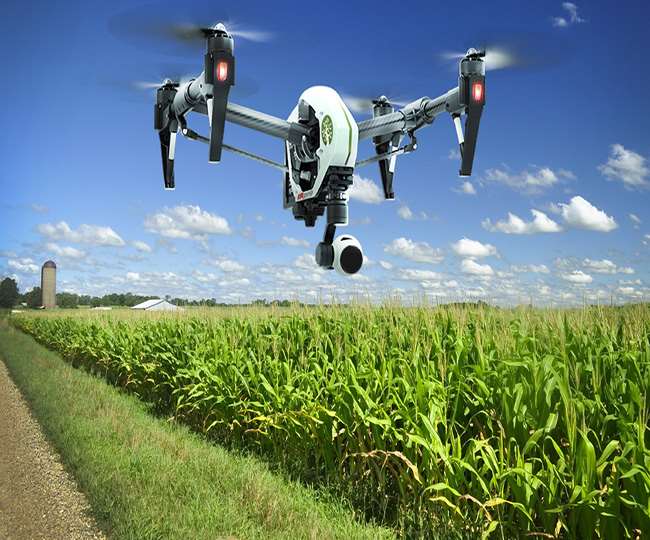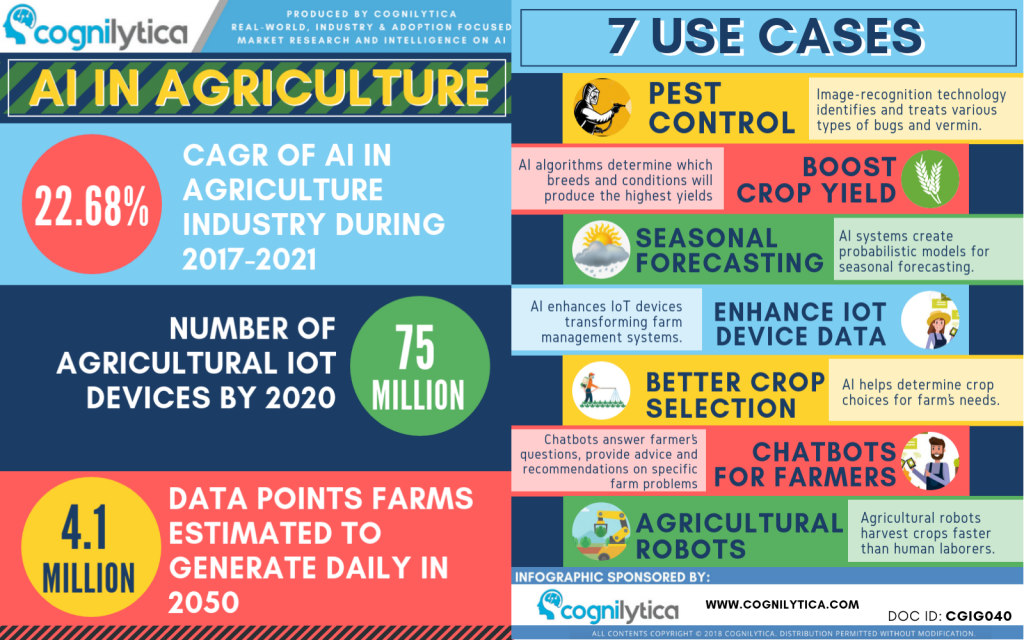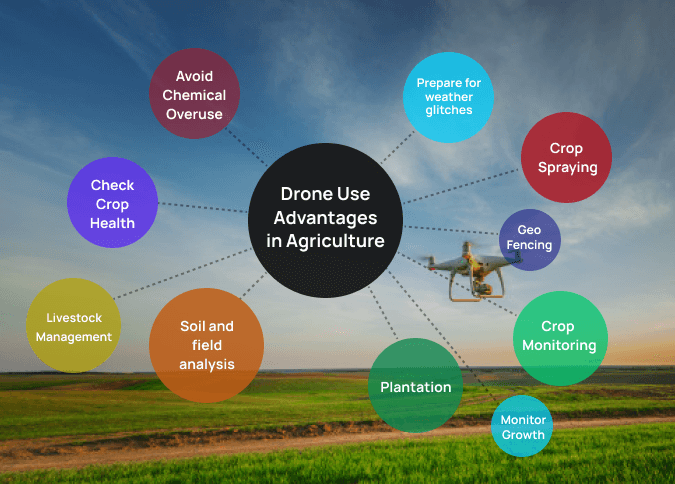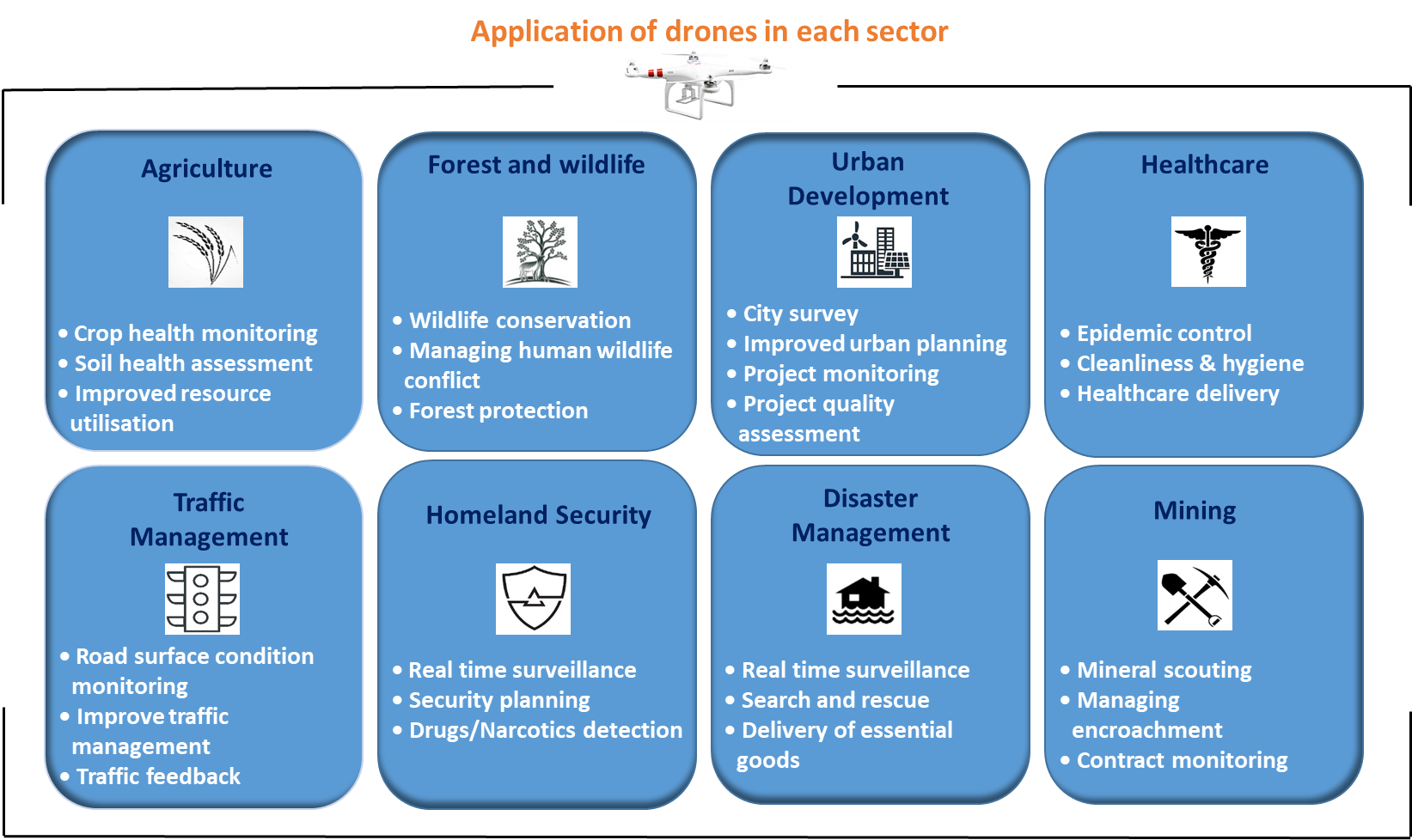KISAN DRONES

Disclaimer: Copyright infringement not intended.
Context
- Union Minister of Agriculture and Farmers inaugurated and addressed the conference on “Promoting Kisan Drones: Issues, Challenges and the Way Ahead”.
- The government is promoting the use of drones for the convenience of the farmers, reducing the cost and increasing the income. For promoting use of Kisan Drones, the government is providing 50% or maximum Rs. 5 lakh subsidy to SC-ST, small and marginal, women and farmers of northeastern states to buy drones. For other farmers, financial assistance will be given upto 40 percent or maximum Rs.4 lakh.
Technology in Agriculture: The need
- Humanity has come a long way over the millennia in how we farm and grow crops with the introduction of various technologies.
- As the world population continues to grow and land becomes scarcer, people have needed to get creative and become more efficient about how we farm…
- using less land to produce more crops and
- Increasing the productivity and yield of those farmed acres.
In Indian context
- When it specifically comes to India, our agriculture is faced with multiple challenges like high dependence on monsoon, resource intensiveness – heavy use of resources (water, inorganic fertilisers and pesticides), degradation of land and loss of soil fertility, and low per hectare yield, among others.
- Agriculture continues to employ 49 per cent of the workforce and contributes to only 16 per cent of the country’s GDP.
- Improvement in agriculture would, therefore, positively impact the well-being of a very large section of the Indian population, apart from delivering food security to our country.
- Feeding over a billion Indians on limited land resources is a big challenge ---- a task that requires technological intervention on a large scale, to enable a giant leap in agricultural productivity.
- It is in this context that, AI can play a catalytic role in improving farm productivity, removing supply chain constraints and increasing market access. It can positively impact the entire agrarian value chain.

Benefits of using Drones in Agriculture
- Enhanced Production - The farmer can improve production capabilities through comprehensive irrigation planning, adequate monitoring of crop health, increased knowledge about soil health, and adaptation to environmental changes.
- Effective and Adaptive Techniques - Drone usage results in regular updates to farmers about their crops and helps develop strengthened farming techniques. They can adapt to weather conditions and allocate resources without any wastage.
- Greater safety of farmers - It is safer and more convenient for farmers to use drones to spray pesticides. It leads to less pollution and chemicals in the soil.
- Less wastage of resources - Agri-drones enables optimum usage of all resources such as fertilizer, water, seeds, and pesticides.
- 99% Accuracy rate - The drone survey helps farmers calculate the precise land size, segment the various crops, and indulge in soil mapping.
- Useful for Insurance claims - Farmers can use the data captured through drones to claim crop insurance in case of any damages. They even calculate risks/losses associated with the land while being insured.

Recent amendment in Initiative to promote usage of Drones in Agriculture
Sub-Mission on Agricultural Mechanization (SMAM)
Scheme
- Ministry of Agriculture and Farmers Welfare launched the Sub-Mission on Agricultural Mechanization (SMAM) in 2014-15.
Implementation
- The SMAM is being implemented by the Department of Agriculture and Farmers Welfare.
- The scheme is implemented by the respective State Governments.
Objectives
- Increasing the reach of farm mechanization to small and marginal farmers and to the regions & difficult area where farm power availability is low.
- Boost up mechanization in the agriculture sector, improved agricultural implements and machinery as essential inputs for modern agriculture.
- Promote ‘Custom Hiring Centres’ and ‘Hi-tech Hubs of High-Value Machines’ to offset the adverse economies of scale arising due to small and fragmented landholding and high cost of individual ownership;
- Creating awareness among stakeholders through demonstration and capacity building activities and ensuring performance testing and certification of agricultural machines at designated testing centres located all over the country.
Importance of mechanization
- It will enhance the productivity of crops besides reducing human drudgery and cost of cultivation.
- Mechanization also helps in improving the utilization efficiency of other inputs that can boost the income of farmers and growth of the agricultural economy.
Recent Amendment and new provisions in SMAM
- Grant:Grant of upto 100% of the cost of agriculture drone or Rs. 10 lakhs, whichever is less, for purchase of drones by the Farm Machinery Training & Testing Institutes, ICAR institutes, Krishi Vigyan Kendras and State Agriculture Universities for taking up large scale demonstrations of this technology on the farmers’ fields.
- Eligibility:The Farmers Producers Organizations (FPOs) would be eligible to receive grant up to 75% of the cost of agriculture drone for its demonstrations on the farmers’ fields.
- Contingency Expenditure:A contingency expenditure of Rs.6000 per hectare would be provided to implementing agencies that do not want to purchase drones but will hire drones for demonstrations from Custom Hiring Centres, Hi-tech Hubs, Drone Manufacturers and Start-Ups.
- Limitation of Expenditure:The contingent expenditure to implementing agencies that purchase drones for drone demonstrations would be limited to Rs.3000 per hectare. The financial assistance and grants would be available until March 31, 2023.
Further steps that are needed to be taken
- Strengthening of Start-ups supporting farmer-producer organisations (FPO), machinery for farmers on a rental basis and information technology-based services.
- Public-private partnership scheme to deliver digital and high-tech services to farmers.
- Attention to other sunshine industries such as artificial intelligence, geospatial systems, semiconductors, space economy, genomics and pharmaceuticals, green energy and clean mobility systems.

Read: https://www.iasgyan.in/daily-current-affairs/artificial-intelligence-in-agriculture-19
https://www.pib.gov.in/PressReleasePage.aspx?PRID=1822070



1.png)
